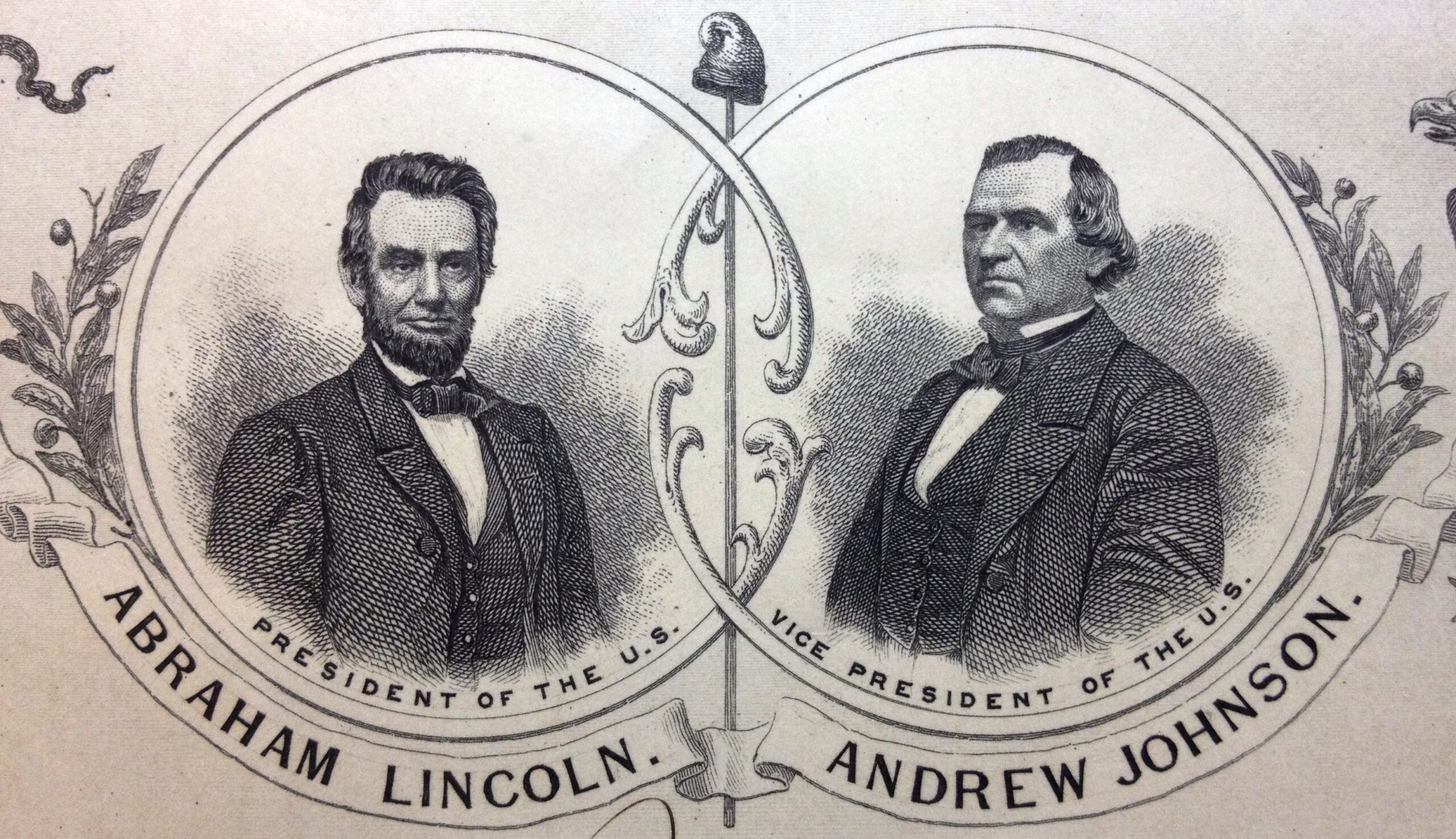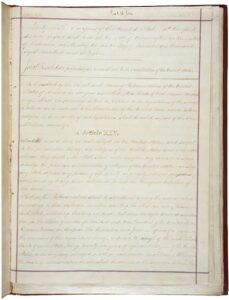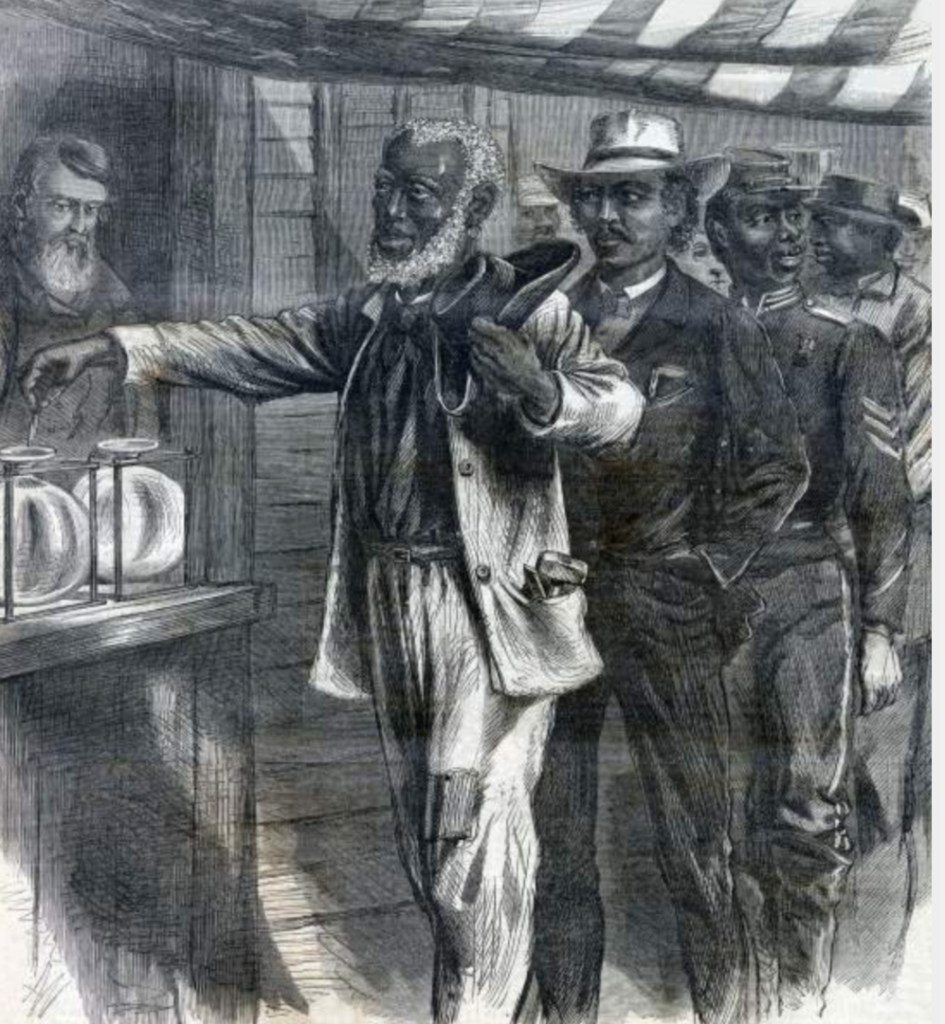nor shall any State deprive any person of life, liberty, or property, without due process of law; nor deny to any person within its jurisdiction the equal protection of the laws.
INTRODUCTION
Today, many historians prefer to describe the Reconstruction Amendments as the “Second Founding” of the country, a period following the Civil War when there was conscious and radical efforts to reframe the American constitutional order. The Thirteenth Amendment abolishing slavery, adopted by Congress in January 1865 and ratified by the states in December 1865, marked the first time that the word “slavery” appeared in the Constitution itself. Republicans intentionally derived the wording abolishing the institution from the Northwest Ordinance (1787) as a way to help vindicate their position that the original intent of the 1787 framers had always been to secure the “ultimate extinction” of slavery in the United States. President Lincoln eagerly supported the amendment –even signing it though his signature was not required– but his assassination in April 1865 prevented him from seeing through the radical change which the amendment seemed to promise.

In fact, Lincoln’s death and the elevation of his anti-black successor, Andrew Johnson of Tennessee, was what propelled Republicans in Congress to push for a more sweeping guarantee of civil and political rights for the formerly enslaved in the Fourteenth Amendment, which they adopted in 1866 and which the states ratified in 1868. The Reconstruction-era battles between more radical and egalitarian Republicans in Congress and the more conservative-minded President Johnson were fierce and unrelenting between 1866 and 1868, when Johnson barely survived an impeachment trial. He escaped removal from office by Congress, but the election of 1868 elevated Gen. Ulysses S. Grant to the presidency. It was during the lame duck period between the two figures that congressional Republicans pushed through one last radical amendment, a voting rights measure designed to protect black men. The exclusion of women from this amendment, adopted in 1869 and ratified in 1870, proved disastrous for the women’s suffrage movement. Over the years, a growing number states authorized female voting in various elections, but it was not until 1920 and the Nineteenth Amendment that American women finally gained constitutional protection for their right to vote.
SOURCE FORMAT: Government documents
WORD COUNT: 535 words
Scene from Seven Spielberg’s “Lincoln” movie (2012) depicting Lincoln and Thaddeus Stevens debating the merits of a Thirteenth Amendment:
Thirteenth Amendment (JAN 1865 / DEC 1865)
Section 1. Neither slavery nor involuntary servitude, except as a punishment for crime whereof the party shall have been duly convicted, shall exist within the United States, or any place subject to their jurisdiction.
Section 2. Congress shall have power to enforce this article by appropriate legislation.
ORIGINS: Northwest Ordinance (1787) Art. 6: There shall be neither slavery nor involuntary servitude in the said territory, otherwise than in the punishment of crimes whereof the party shall have been duly convicted…
Fourteenth Amendment (1866 / 1868)

Section 1. All persons born or naturalized in the United States, and subject to the jurisdiction thereof, are citizens of the United States and of the State wherein they reside. No State shall make or enforce any law which shall abridge the privileges or immunities of citizens of the United States; nor shall any State deprive any person of life, liberty, or property, without due process of law; nor deny to any person within its jurisdiction the equal protection of the laws.
Section 2. Representatives shall be apportioned among the several states according to their respective numbers, counting the whole number of persons in each state, excluding Indians not taxed. But when the right to vote at any election for the choice of electors for President and Vice President of the United States, Representatives in Congress, the executive and judicial officers of a state, or the members of the legislature thereof, is denied to any of the male inhabitants of such state, being twenty-one years of age, and citizens of the United States, or in any way abridged, except for participation in rebellion, or other crime, the basis of representation therein shall be reduced in the proportion which the number of such male citizens shall bear to the whole number of male citizens twenty-one years of age in such state.
Section 3. No person shall be a Senator or Representative in Congress, or elector of President and Vice President, or hold any office, civil or military, under the United States, or under any state, who, having previously taken an oath, as a member of Congress, or as an officer of the United States, or as a member of any state legislature, or as an executive or judicial officer of any state, to support the Constitution of the United States, shall have engaged in insurrection or rebellion against the same, or given aid or comfort to the enemies thereof. But Congress may by a vote of two-thirds of each House, remove such disability.
Section 4. The validity of the public debt of the United States, authorized by law, including debts incurred for payment of pensions and bounties for services in suppressing insurrection or rebellion, shall not be questioned. But neither the United States nor any state shall assume or pay any debt or obligation incurred in aid of insurrection or rebellion against the United States, or any claim for the loss or emancipation of any slave; but all such debts, obligations and claims shall be held illegal and void.
Section 5. The Congress shall have the power to enforce, by appropriate legislation, the provisions of this article.
ORIGINS: Civil Rights Act of 1866 SEC. 1: That all persons born in the United States and not subject to any foreign power, excluding Indians not taxed, are hereby declared to be citizens of the United States;
Fifteenth Amendment (1869 / 1870)
Section 1. The right of citizens of the United States to vote shall not be denied or abridged by the United States or by any State on account of race, color, or previous condition of servitude.
Section 2. The Congress shall have the power to enforce this article by appropriate legislation.
ORIGINS: Reconstruction Act (1867) SEC. 5: And be it further enacted, That when the people of any one of said rebel States shall have formed a constitution of government in conformity with the Constitution of the United States in all respects, framed by a convention of delegates elected by the male citizens of said State, twenty-one years old and upward, of whatever race, color, or previous condition of servitude

DISCUSSION QUESTIONS
- Why would Republicans in particular have found it so appropriate to borrow phrasing from the Northwest Ordinance (1787) to frame the Thirteenth Amendment?
- The first section of the Fourteenth Amendment defined citizenship but then shifted to a discussion of how due process and equal protection rights applied to “any person.” What was the significance of that shift from citizens to people?
- The Fifteenth Amendment limited how states might restrict voting rights. What type of restrictions did it allow?
FURTHER READING
Citizenship, rights, democracy — as long as these remain contested, so will the necessity of an accurate understanding of Reconstruction. More than most historical subjects, how we think about this era truly matters, for it forces us to think about what kind of society we wish America to be. –Eric Foner, 2015
Historian Eric Foner on the Fourteenth Amendment
- FEATURED COLLECTION: Prince of Emancipation (House Divided Project)
- Unofficial Teacher’s Guide to Spielberg’s “Lincoln” (House Divided Project)
- Eric Foner, “Why Reconstruction Matters,” New York Times, March 28, 2015
- James Oakes, The Radical and the Republican (2007), pp. 247- 264
- Susan B. Anthony trial statement (1873)
- Jonathan Katz, “Birth of a Birthright,” Politico (2018)
- STUDENT CLOSE READING: TBD
- Handout –Reconstructing Constitution
